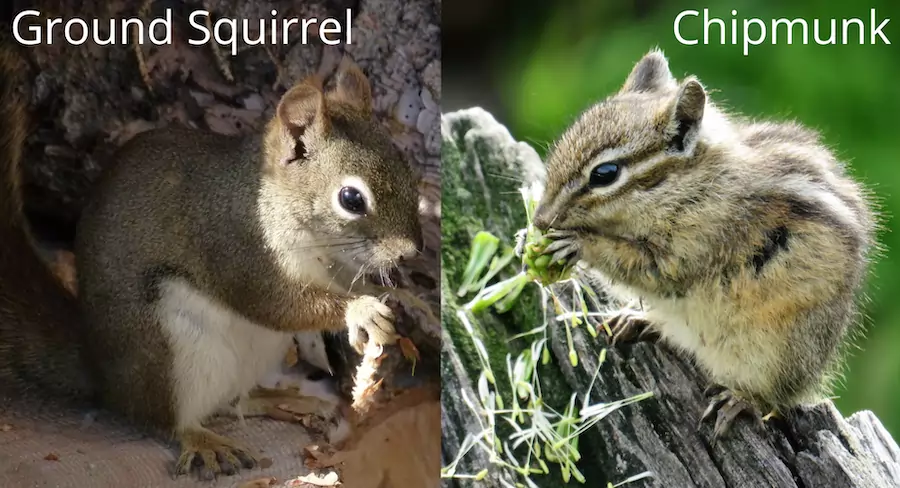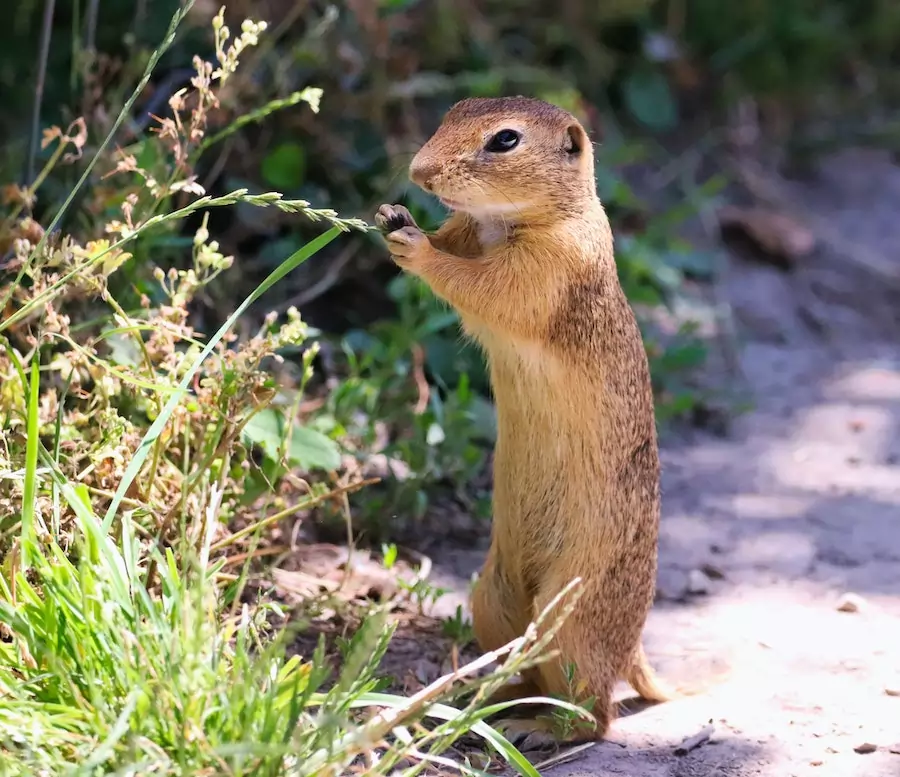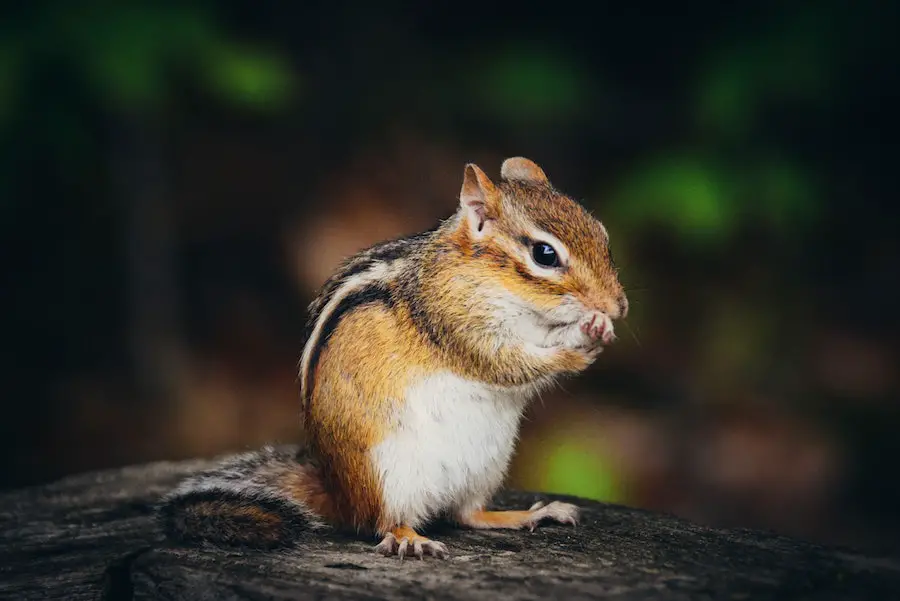Mostly during fall, you might have seen ground squirrels and chipmunks wandering around, searching for food as they prepare for winter. And at first sight, you might find both of them identical – or at least quite similar. Well, there are differences between chipmunk vs ground squirrel.
So in this article, we’ll go over all the prominent differences between chipmunk vs ground squirrel. Starting with a quick summary answer…
Chipmunk’s ears protrude above the head. Ground squirrels have shorter, smaller ears that are close to the head and almost flat. Chipmunk tails are bushier than ground squirrels and often hold their tail high when running. The thirteen-lined ground squirrel’s tail is long and sleek and remains low.
Difference between Chipmunk vs Ground Squirrel
Squirrels and Chipmunks both belong to the same family named Sciuridae. This classification contains: squirrels, chipmunks, marmots, prairie dogs
You can learn more about classifications in my article on Kingdom Animalia.
So this means that essentially, chipmunks and squirrels are distant cousins whose ancestry stems back through thousands of years of development.
Both of these are considered to be rodents and both have brown, reddish-brown, or grayish-brown fur appearance. Ground squirrels are longer and heavier compared to Chipmunks. The most striking and obvious difference in both of these is the existence of stripes on the chipmunk’s head.
Chipmunks are small striped animals native to Asia and North America.
The stripes are present on the head, tail, and back. Ground squirrels are usually found in open rocky and woody areas. Unlike Chipmunks their stripes are not highly visible on their heads.
The thirteen-lined ground squirrels are probably named because of the 13 narrow stripes on their body. All of these stripes are not the same width or shade.
They contain seven dark brown stripes along with six tan stripes. The dark brown stripes mostly contain “spots” which give it the dotted appearance. By contrast, a chipmunk’s markings consist of five wider tan and brown alternating stripes.
Many squirrels species live in trees, while chipmunks largely remain in their burrow and make use of multiple tunnels. Both of these animals love to eat nuts and seeds, but their exact diets can vary.

Chipmunk vs ground squirrel: Size
As we have mentioned previously, squirrels are usually larger in size, and their body measures almost between 9 to 12 inches, excluding their tail that can add another 12 inches to their length.
A chipmunk’s body averages 3 to 5 inches long. The tail adds an additional 3 to 5 inches to its length.
Chipmunk vs ground squirrel: Habitat
You will generally find ground squirrels in woodlands and wooded areas. Squirrels build their own nests in high branches of trees. These places enable their young to grow with a greater degree of protection from predators.
Chipmunks are usually found in forests, mountains, and deserts. They prefer burrows that contain multiple tunnels. These small creatures also create tunnels to store food and to keep them safe.
Chipmunk vs ground squirrel: Appearance
As discussed earlier, Chipmunk usually contains black and white stripes on its back and side. Alternatively, ground squirrels have stripes on their head and back.
Do all chipmunks have stripes?
Chipmunks are members of the squirrel family, but they aren’t the only squirrels out there with stripes. In other words, all chipmunks are striped squirrels, but not all striped squirrels are chipmunks.

Chipmunk vs ground squirrel: Lifespan
Ground squirrels usually live for up to 12 years. Chipmunks typically have a lifespan of up to 6 years.
It is believed that ground squirrels live longer because they are better able to hide and shelter in treetops where predators cannot easily catch them. It’s also worth noting that the list of predators is longer for chipmunks comparatively.
Chipmunk vs ground squirrel: Diet
Both of these animals eat nuts and seeds and berries. You can find a complete list of what a Squirrel eats here. However, Chipmunks are more inclined to eat insects too.
But, chipmunks and ground squirrels are both considered to be omnivores and periodically eat small animals and insects.
Chipmunk vs ground squirrel: Hibernation
During winter, Chipmunks partake in a partial habitation routine. In other words, they sleep for a few days and then emerge from their burrow in search of food.
Squirrels take fall as the period ideal for adding to their diet in preparation for winter, as well as the opportunity to collect and store food.
Chipmunk vs ground squirrel: Location
Around 200 species of squirrels are present in numerous areas around the world – in fact, every continent except for Australia and Antarctica.
However, there are almost 26 species of Chipmunks, out of which twenty-five are invariably found in North America. The one not native to North America is the Siberian Chipmunk which is found in Siberia.
Chipmunk vs ground squirrel: Predators
Snakes will prey on baby and juvenile ground squirrels, so squirrels will often attack snakes in order to protect their young. The adult ground squirrel will kick up gravel and seek to injure the snake through biting. Ground squirrels are often resistant to snake venom, especially rattlesnakes.
Chipmunks are the target of snakes, but they are not so strong to defend against them. Both of these animals make different types of sounds as alarm calls. These sounds vary from species to species.
Let’s go over some additional questions that people have around chipmunk and ground squirrel comparisons.
Do squirrels eat Chipmunks?
Both chipmunks and squirrels are highly protective of both their territory and their offspring and so will engage in a fight if they are forced to. The two will rarely interact, but as a squirrel is comparatively stronger, if they do fight then the squirrel will most likely be the victor.
Are Chipmunks really smart?
Chipmunks are considered to be clever animals. But they can be aggressive, approaching them, or trying to keep them in captivity is difficult as they have a tendency to bite. They also use their scent from cheeks and urine, and keepers must accommodate their hibernation routines.

Can Chipmunks mate with squirrels?
Do Squirrels and Chipmunks Mate? No. They barely deign to notice each other in passing as they go about their daily lives. Although they’re both members of the Sciuridae family of rodents, they have so little in common there’s really nothing to attract them or bring them together.
No, chipmunks and squirrels will not mate. Although both of these belong to the Sciuridae family of rodents, they are not compatible with one another. They have so little in common that there is no attraction to mate. In fact, they barely notice each other.
Do chipmunks mate for life?
Chipmunks are mostly solitary creatures except during the breeding season which occurs twice a year in spring and late summer. Males (bucks) and females (does) will seek a suitable partner. Then they will part company. The female will raise the pups, until their offspring leave.
Do ground squirrels mate for life?
Squirrels do not mate for life. They will only seek a partner during mating season and will then part company. The female alone will raise the kits for around 6 weeks. Beyond this, the young will spend some weeks near the den before seeking their own territory.
How can you identify the ground squirrels?
The ground squirrels contain stripes just like Chipmunks; however, they are not present on the head. It is larger in size and consists of a long tail.
Is it bad to have chipmunks around the house?
Chipmunks do burrowing, which may lead to some serious destruction or structural damage. They usually select to dig their tunnels under the sidewalks and also driveways which may result in weakening of these and cause damage to these areas.
More wildlife help
We hope this has been helpful. Be sure to check out our other articles on the Ranger Planet website. Or visit our Ranger Planet YouTube Channel.
